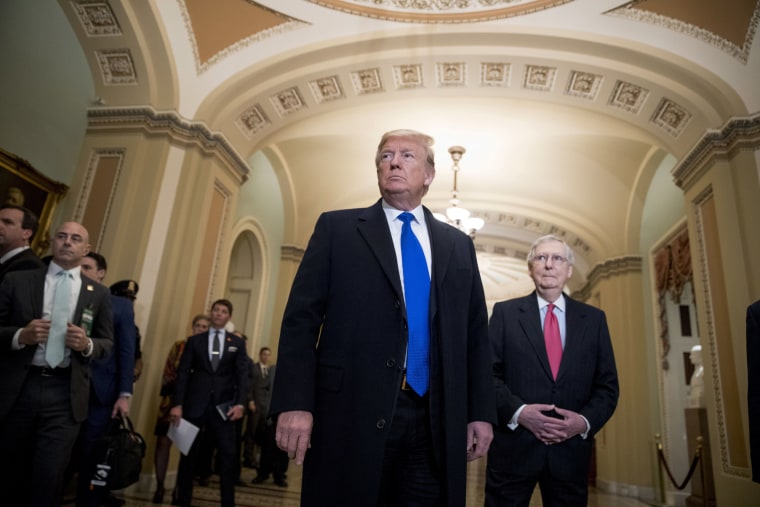WASHINGTON — President Donald Trump once again voiced his opposition around disaster aid funding for Puerto Rico, complicating matters in Congress before a vote on a disaster aid package.
Trump told Republican legislators at a Capitol Hill meeting on Tuesday that the U.S. territory has gotten too much rebuilding money compared with mainland states like Florida and Texas.
According to Sen. Marco Rubio of Florida, Trump told Republicans during a closed-door luncheon that aid for Puerto Rico “is way out of proportion to what Texas and Florida and others have gotten.”
Puerto Rican Gov. Ricardo Rosselló called the comments “irresponsible, regrettable and, above all, unjustified” and described Trump as someone who “lacks empathy.”
“The comments attributed to Donald Trump today by senators from his own party are below the dignity of a sitting president of the United States,” said Rosselló in a statement Wednesday.
Trump’s opposition to additional Puerto Rico funding sets up a showdown with House Democrats, who insist that a $13 billion to $14 billion disaster aid package that is a priority for Republican legislators from southern states won’t advance without further aid for the island.
Ahead of the Senate vote on the disaster aid package, which is expected to pass this week, minority leader Chuck Schumer, D-N.Y., and Appropriations Chairman Patrick Leahy, D-Vt., blasted Trump and his administration “for continuing to undermine the immediate and long-term recovery efforts in Puerto Rico.”
In a letter Schumer and Leahy sent to Mick Mulvaney, acting chief of staff at the Office of Management and Budget Director; Peter Gaynor, acting FEMA administrator; and HUD secretary Ben Carson, both senators expressed concerns over “the significant and unsupported delays related to the immediate and long-term recovery needs of Puerto Rico in the aftermath of catastrophic Hurricanes Irma and Maria,” as billions of dollars approved by Congress a year and a half ago remain in the Treasury in Washington and have not made their way to the Puerto Rican people.
House Appropriations Committee Chairwoman Nita Lowey, D-N.Y., said the House will insist on further aid for Puerto Rico or the disaster aid measure won’t clear Congress.
The measure has wide support from Democrats and Republicans and is backed by David Perdue, R-Ga., and Thom Tillis, R-N.C., whose states were slammed by hurricanes last fall. The measure has been expanded so that Midwestern states such as Iowa and Nebraska that are currently suffering from flooding are eligible for disaster help.
“Just at the time when harvesting was starting, Hurricane Michael hit and crops were completely destroyed across most of our state,” Perdue said.
The House passed a companion $14.2 billion version of the legislation in January, but it got tangled up in the politics of the partial government shutdown and Trump’s demands for a wall along the U.S.-Mexico border.
The measure is especially sought by lawmakers from Southern states like Florida, Georgia and North Carolina, which were hit by hurricanes Michael and Florence last year. There’s money to respond to an earthquake in Alaska, wildfires in California and floods in South Carolina and for the ongoing recovery effort in Puerto Rico, which was devastated by back-to-back hurricanes in 2017.
Puerto Rico’s decade-long recession has left the island unable to fully fund its own reconstruction and recovery process. However, accomplishing this has turned out to be more difficult than expected amid threats from the president to cut funding for Puerto Rico.
Earlier this year, the Trump administration publicly opposed that Puerto Rico receive $600 million to finance food stamp shortfalls, calling it “excessive and unnecessary” and considered using $2.5 billion assigned for reconstruction projects in the island to pay for a U.S.-Mexico border wall.
According to Rubio, Trump supports the food stamp funding but opposes more generous terms for delivery of disaster aid dollars and funding to rebuild antiquated water systems and make them more resilient to future storms.
For over a year, Trump and his administration have been criticized over their response to Hurricane Maria in Puerto Rico.
In the immediate aftermath of the storm, over 200,000 Puerto Ricans left for the mainland — some temporarily — and Puerto Rico incurred about $90 billion in damages.
When Trump first visited the disaster area in October 2017, he said that Puerto Rico was not a “real catastrophe" like Hurricane Katrina in New Orleans.
Months later, a study commissioned by the Puerto Rican government revealed that at least 2,975 people died in Puerto Rico from the effects of Hurricane Maria — including a lack of electricity, impassable roads and a scarcity of medications and other provisions — making it the deadliest natural disaster in the U.S. in 100 years.
Trump has not yet publicly acknowledged or mourned the victims of the catastrophe following the revised figures.
Federal government offices such as FEMA acknowledged agency failures in areas such as staffing and coordination in an after-action report, while agencies like HUD allocated historic amounts of funding for the island in the area of housing, infrastructure and energy — but most of the money has not made its way to communities in need.
FOLLOW NBC LATINO ON FACEBOOK, TWITTER AND INSTAGRAM.

